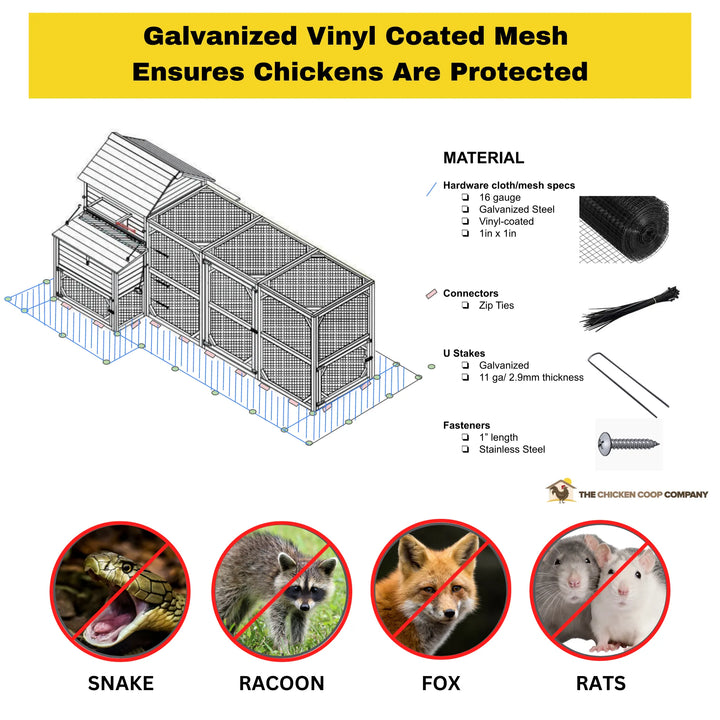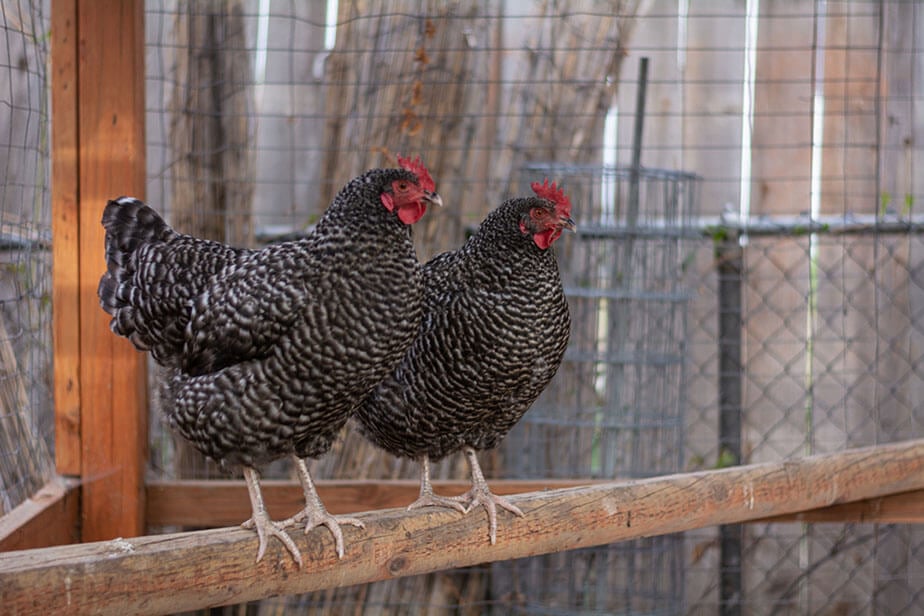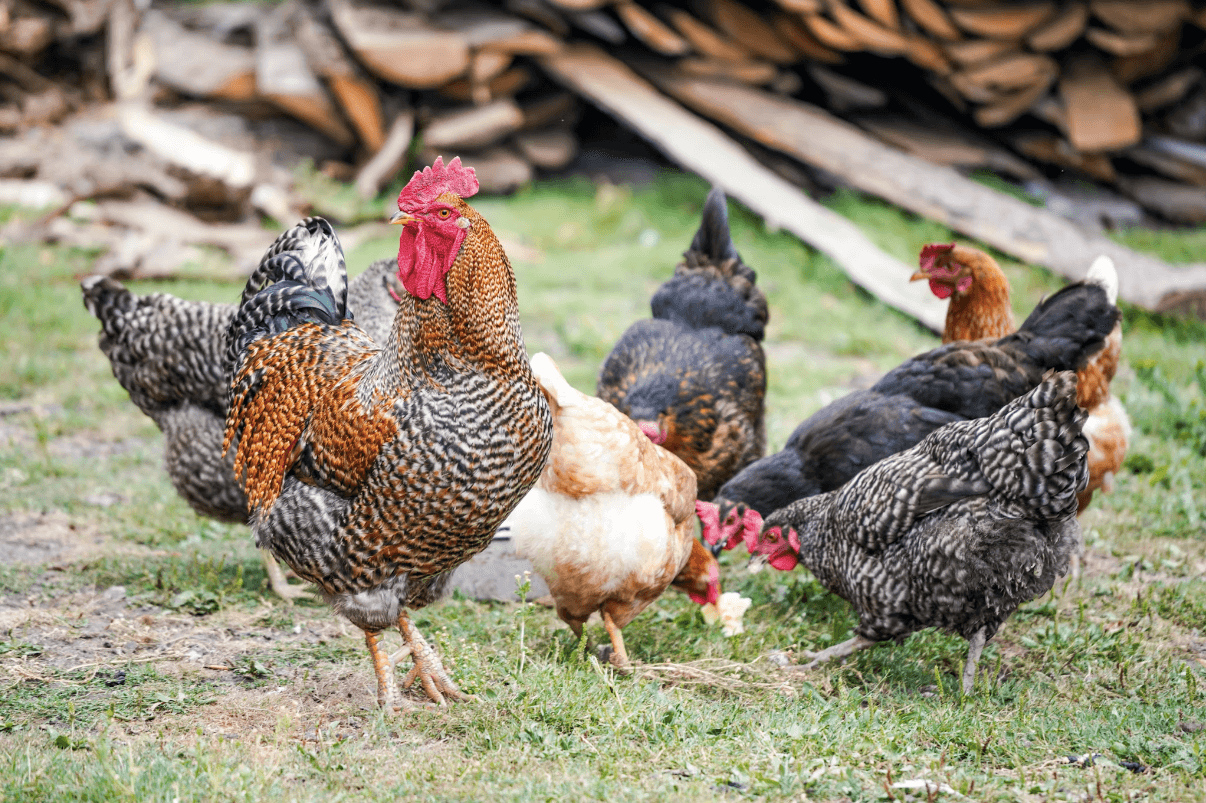
But what should be inside a chicken coop? In this blog post, we will discuss the 11 essential features of a chicken coop and why they're important. From nesting boxes to predator protection, we've got you covered.
1. Adequate Space
Your chickens need enough space to move around and exercise. The general rule of thumb is to provide at least 2-3 square feet per chicken which includes the space in your run. This can vary based on the size of your chickens so if you have a larger flock you'll need a large chicken coop.
As an example you're planning to keep six chickens, you would need a coop and a run extension area that's at least 12-18 square feet. A chicken run is also a great addition as it gives your chickens more outdoor space to roam around and forage while staying safe from predators.
2. Roosting Bars
Sleep is one of the most important things for human health so when we think about what should be inside a chicken coop sleep is top of mind. Chickens naturally roost at night which is their version of sleep. By installing roosting bars, you're providing a comfortable place for them to rest.
Roosting bars should be at least two inches wide and placed at the right height; about 12 to 18 inches above the chicken coop floor. This prevents predators from getting easy access to the birds. It also helps keep the chickens warm since they are able to stay off the cold ground. They will roost close together so if you have a chicken coop for 6 chickens just know that they will snuggle up on the roosting bars together.

By providing this level of security, chickens are able to rest more easily and deeply, allowing them to build strength and resist illness.
In addition to providing comfort and safety for chickens, proper roosting bars also help promote good hygiene in the coop.
Since chickens naturally droppings will accumulate under their feet while they sleep on the roosts, it is important for these droppings to be removed regularly as part of general maintenance of your chicken coop.
If not cleaned properly, this buildup can cause bacteria to spread quickly throughout your chicken coop, leading to a host of health issues for your flock. Therefore, it is essential that you take proper care of your roosts by cleaning them regularly in order keep your chickens healthy and happy.
3. Nesting Boxes
A nesting box is essential for your hens to lay their eggs, and it's also a cozy place for them to rest. One nesting box is required for every four chickens, and it should be filled with nesting material like straw or shavings. The nesting box should be located in a private area away from the roosting bars.

Furthermore, as we talked about above, nesting boxes create a comfortable environment for chickens which is important for their overall wellbeing.
Chicken Nesting Pads are an ideal solution for setting up a secure and comfortable nesting space in your coop or hen house.
The pads are designed to fit standard-sized nesting boxes and feature an absorbent, anti-microbial layer which helps to keep eggs clean. The pads are easy to install and come in a variety with aromatic nesting herbs or plain. It is vitally important that any chicken coop includes adequate nesting spaces as comfortable and unstressed chickens will lay the best eggs.
4. Ventilation
Good ventilation in a chicken coop is essential for the health and wellbeing of your chickens. Proper ventilation helps to ensure that air quality and temperature remain at optimal levels, creating a safe living environment for your chickens. When air becomes stagnant and stale, it can cause an unhealthy buildup of ammonia from droppings, leading to respiratory issues and other infections.
Ventilation in the coop should be designed to provide adequate airflow while keeping out drafts that can cause illness or distress. Optimal coop ventilation will allow fresh air in while breathing out old air full of dust, feathers, moisture and gases created by their droppings.
This exchange of fresh air for stale is important for controlling the temperature inside the coop so that chickens are kept comfortable no matter what season it is. A well-ventilated space will also allow more time between cleanings as you won’t have to worry about bad odors or bacteria building up over time.

For colder climates, insulation should be used around windows and doors to help prevent heat loss while still allowing airflow into the space.
In most cases, one window per side of the coop should suffice as long as there is plenty of open space between perches and nesting boxes for circulation purposes.
Overall, good ventilation in your chicken coop is imperative for maintaining a healthy environment for your birds. Not only does it help control temperature extremes throughout seasons but provides much-needed airflow which reduces dust build-up in bedding material as well as ammonia fumes from droppings.
When done correctly, you’ll find that having a well-ventilated chicken coop will increase their quality of life and productivity in laying eggs!
5. Food and Water Containers

The type of feeder or waterer you choose will depend on your needs and your goals for raising chickens.
Popular types of feeders include hanging feeders, trough feeders, and automatic feeders. Popular types of waterers include gravity-fed waterers, nipple waterers, and heated waterers.
It can be hard to figure out what's best for your flock. We are big fans of a gravity-fed chicken waterer with freeze-proof nipples. This setup keeps the waterer clean and easy to fill and also allows you to insert a heating element for those climates that require it.
Make sure that your chosen type of container is easy to clean regularly, which will help keep your flock healthy. It is also important that the containers are placed in an area where all chickens can easily reach them so they have access to food and water at all times.
6. Insulation
As a chicken expert, I understand the importance of insulation in chicken coops. Proper insulation helps to regulate the temperature within the coop, which is essential for keeping chickens comfortable throughout all four seasons.
In cold climates, insulation helps to keep heat trapped within the coop and reduces the amount of energy needed by chickens to stay warm. This also protects chickens from winter drafts and potentially dangerous temperatures.
During hot summer months, insulation can help keep the air temperature inside the coop cooler and make it easier for chickens to cool down. By reflecting sunlight away from the coop during these warmer months, insulation keeps chickens from getting too hot and feeling uncomfortable.
Insulation also helps conserve energy by keeping cold air out in winter and warm air out in summer. By reducing how much energy is needed for heating or cooling, insulation helps reduce electricity costs associated with maintaining a safe environment for your flock of chickens.
Additionally, proper insulation reduces noise pollution from outside sources such as traffic or lawn mowers as well as dampens noise within the coop itself- helping your hens get more restful sleep throughout the day and night!
Insulation helps regulate temperature both in summer and winter by trapping heat or reflecting sunlight away from the coop while also conserving energy costs associated with heating or cooling it down accordingly. It can also reduce noise pollution both inside and outside of the coop so that your hens can get plenty of restful sleep each night!
7. Adequate Lighting
Lighting is important to stimulate egg production in your hens. A chicken coop should have enough natural light during the day and supplemental light as required. About 14 hours of light is recommended for optimal egg production. Proper lighting also encourages natural behaviors such as pecking at grains, scratching and dust bathing.

If you can’t provide enough natural light in your coop then you can use artificial lights as well. Artificial lights offer the same benefits of natural lighting but can be used in situations where there isn’t enough natural sunlight available.
They also allow you to control the amount of light that your chickens receive during certain periods of time (day or night).
When using artificial lights it is important to make sure that they are not too bright as this could cause stress for your chickens or even damage their eyesight if overexposure occurs. It is recommended that you use red or yellow bulbs which have been specifically designed for use with poultry as these are much softer on the eyes than white light bulbs which can be too harsh for chickens.
Additionally, it is important to make sure that all lights are turned off during the night so that your chickens get a good restful sleep every day in order to stay healthy and productive.
8. Clean Bedding

It is important to keep these materials clean and dry as they can harbor parasites, bacteria, and other harmful organisms if they become wet or soiled.
Straw is great as it is absorbent and makes it easy to spot droppings in the coop. You should ensure that any straw used is fresh and free from mold or debris. Hay can also work well although it may need changing more regularly than straw due to its tendency to clump together when wet.
Wood shavings are another popular option as they are lightweight, absorbent, and easy to maintain. Be sure to select wood shavings that are dust-free as this will reduce the risk of respiratory irritation in your chickens.
Sand is also an excellent choice for bedding material as it helps with odors, absorbs moisture well, and won't clump together like hay when wet. However, care must be taken to avoid using sand that contains dirt or debris which could be a source of distress for your chickens.
When it comes to maintaining these materials, regular cleaning and replacement should be done on a weekly basis to ensure your chickens have a safe and healthy environment in which to live. A chicken coop poop tray that pulls out and allows for easy cleaning can be a real life saver. Dispose of any old bedding material safely outside the coop before replacing it with fresh material. This will help prevent the spread of any parasites or bacteria that may be present in the old bedding.
9. Secure Flooring
In addition to having clean bedding, it is essential to have a secure and suitable flooring in the coop. Several types of flooring can be used including gravel, concrete, dirt or grass outdoor runs, solid wood panels, wire mesh floors, rubber mats, or even layering various materials like straw on top of wood panels.
Each type of flooring has pros and cons; for example gravel floors are easy to maintain but do not provide adequate insulation while rubber mats are more difficult to clean but provide better insulation during colder temperatures.
Ultimately when selecting a flooring material it’s important to consider factors such as climate conditions, ease of maintenance and cleaning, budget constraints, amount of space available, etc.
10. Security / Predator Protection

A combination of different strategies can be used to safeguard chickens from certain predators, such as wire mesh, electric fences, locks, deterrents and guard animals.
Wire mesh fencing around the chicken coop and run areas is an effective way of keeping out many predators, including foxes, coyotes and raccoons. The mesh should be buried at least six inches below ground level to prevent predators from digging underneath the fence and should also have a secure gate that can be locked when not in use.
Electric fences are a great way to keep out larger predators such as bears and wolves but can be dangerous for children and pets. They provide an electric shock when touched which will deter most animals away from the area. Electric fences should be installed correctly and regularly checked to ensure they are working properly.
Locks can also be used to keep out predators by securing any doors or windows into the chicken coop or run areas. It is important that these locks are sturdy enough to withstand pressure if a predator attempts to break in. Locks might be used to secure run doors.
There are also several natural deterrents that can help protect chickens from predators including dogs, cats and owls which may scare away certain animals such as foxes or raccoons. Other deterrents include loud noises or bright lights particularly if placed around the perimeter of the chicken area at night when most nocturnal predators are active.
Another option is using guard animals such as llamas or donkeys which may protect chickens from predators by either fighting them off or simply scaring them away with their presence. It is important that these animals receive appropriate care to ensure they remain healthy so they can effectively protect your flock of chickens.
For those looking for an all-in-one solution a Predator Protection Kit can be a great idea.
Chicken Coop Predator Protection Kit

$ 104.99
Protect your beloved chickens from predators with this durable and easy-to-install Bottom Extension Wire Mesh for your chicken coop. Made from high-quality materials, this one-inch coated predator-proof wire mesh is designed to keep rodents, skunks, raccoons, foxes, and coyotes out… read more
These kits usually include hardware cloth that will go around the outside of your coop and is secured with ties to the coop and stakes on the outside. This ensures animals can't dig under your coop which is the way most animals get in so you can rest assured your chickens are safe from harm!
11. Easy Cleaning Access
Keeping your chicken coop clean is essential for your chickens' health and hygiene. Cleaning the coop regularly can be made easier by designing your coop with easy cleaning access. The coop should have doors that open outwards, to allow for thorough cleaning.
In conclusion, creating a well-built chicken coop with essential features is fundamental when raising backyard chickens. Your chickens will be comfortable, safe, and healthy with proper accommodation, ventilation, food, and water access, and proper sanitation. Remember that a happy chicken is a productive chicken and will lead to abundant fresh eggs in your backyard.
Frequently Asked Questions
Q. What's the ideal lighting setup for a chicken coop?
A. Chicken coop accessories like lighting can be a fantastic addition and help your chickens adjust to the various seasons. The ideal lighting setup for a chicken coop should include natural sunlight during the day, as well as some type of artificial light at night. The artificial light can be a low wattage red or white LED bulb that provides enough light to allow chickens to find food and water. It is important to keep the lights dim enough so that chickens can still sleep comfortably.
Q. How do I ensure proper ventilation inside the chicken coop?
A. To ensure proper ventilation inside the chicken coop, it is important to have an adequate amount of air circulation. This can be done by making sure there are open windows and doors that provide fresh air circulation and have screens in place to keep out larger pests such as rodents. Additionally, make sure the coop is insulated to help regulate temperature, but not so much so that it stops airflow altogether.
What kind of roosting bars do chickens need?
A. Chickens need a roosting bar made from a material such as wood where they can rest and sleep during the night. The roosting bars should be elevated above the ground several inches with enough space between them for all chickens to fit comfortably while standing side-by-side. Some roosting bars may also come with hooks or holders to keep feeders off the ground which prevents contamination from feces and other debris.
Q. How many nesting boxes should I have in my chicken coop?
A. It is recommended to have one nesting box per four chickens in your flock. The boxes should be placed several inches off the ground and filled with plenty of straw or other soft materials for insulation and comfort when laying eggs. It is also important to keep nesting boxes clean on a regular basis by removing any old straw, droppings, or broken eggs before adding fresh bedding materials.
Q. How often should I clean and maintain the inside of a chicken coop?
A. The inside of a chicken coop should be cleaned and maintained every two weeks or more often if necessary depending on how many chickens are in the flock. Cleaning involves sweeping away droppings, replacing bedding material, wiping down walls with a disinfectant solution (vinegar works great), airing out any damp areas, and washing down any feeders or water containers with warm water and mild soap detergent if needed.
Q. What should not be in a chicken coop?
A. Items such as sharp objects, electrical cords that could become tangled or chewed up by chickens, metal items like wire mesh or cans that could cause injury if pecked at, chemicals such as paint solvents or cleaning products, anything poisonous like toxic plants or insecticides should all be kept out of the chicken coop at all times for safety reasons.
Q. What is a natural disinfectant for chickens?
A. A natural disinfectant for chickens includes apple cider vinegar mixed into their drinking water which helps balance pH levels naturally without harsh chemicals while providing essential minerals beneficial for overall health maintenance in birds. Other natural disinfectants include oregano oil diluted in warm water which helps fight bacterial infections when sprayed onto surfaces inside the coop periodically throughout the year.
Q. How do I keep my chicken coop from smelling?
A. Keeping your chicken coop from smelling involves cleaning regularly as mentioned previously but also keeping an eye out for any mold growth due to moisture buildup inside the coop which could lead to an unpleasant odor over time if left untreated. Vinegar works great at killing mold spores naturally while baking soda absorbs odors well when sprinkled onto damp areas inside your coop.





